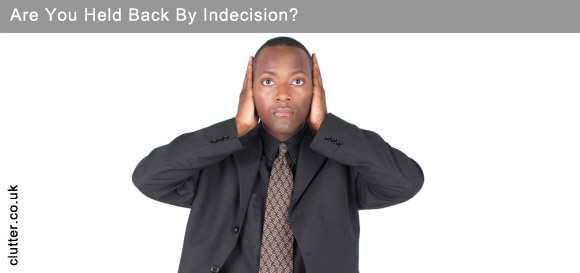We’re all surrounded by things we don’t use. Look around you. Look carefully at every object in your vision and ask yourself “Do I use this?” If the answer in many instances is no, as I suspect, then why are you keeping these objects? Why keep things that you never use?
Why Do We Do It?
The reason could well be indecisiveness. The inability to make a decision is responsible for about seventy per cent of clutter, in my opinion. The following scenarios may be playing out in your mind:
What if I need it one day?
I might regret not keeping this.
It could be valuable.
It was a gift so I have to keep it.
Your Doubts Can Kill
These self-doubts cause you to be indecisive. They kill any attempt to make a decision and carry it out. And so your clutter remains, holding you back and making it more difficult for you to function.
In order to be free of your clutter you have to stamp on your self-doubts. You have to beat down that indecisiveness. What’s needed here is a small leap of faith. If you really, truly, want to be clutter-free then you have to say to yourself, “What’s the worst thing that could happen if I give this object away?”
Decison Time
At this point you have to decide whether the object is replaceable. It it’s a photo or childhood toy then it’s irreplaceable and you need to think much more carefully before giving these away. Make sure you are positive that you won’t regret it. It makes sense to keep a few memory-evokers, but don’t keep everything!
If the object in question is easily replicated then your decision is much easier. The worst thing that could happen is that you might have to buy another one. If the object is is a house, car or diamond necklace then you need to weigh up your decision carefully! But most items can be easily replaced and therefore the risk is very low.
A Simple Equation
I have very rarely regretted giving something away and I declutter continually! The risk of being overwhelmed with clutter is far greater, than the risk of regretting the loss of an easily replaceable object. The impact of your clutter is harming you far more, than the dubious benefit gained from keeping an object you don’t use for twenty years.
Ultimately the equation is a simple one. If your clutter is caused by indecisiveness then weigh up the risks and benefits of keeping versus discarding your clutter. The certain benefits of having more space, against the remote risk of you regretting a decision to discard.
You’re Already Doing It
The fact is that you are already making decisions when you decide to keep your clutter. You are being decisive when you determine to hang on no matter what. Why not decide instead to improve your life, by freeing yourself of the clutter that is weighing you down? You can make decisions, just make sure they’re the right ones.


